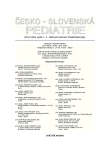-
Medical journals
- Career
The Deficiency of Immunoregulatory T Cells in Children with Diabetes Mellitus
Authors: N. Sedláková 1; P. Praksová 1; M. Pejchlová 2; L. Kovářová 3; H. Hrstková 2; J. Michálek 2,3
Authors‘ workplace: studentka Lékařské fakulty MU, Brno 1; I. dětská interní klinika, FN Brno přednostka prof. MUDr. H. Hrstková, CSc. 2; Laboratoř experimentální hematologie a buněčné imunoterapie, FN Brno vedoucí doc. MUDr. R. Hájek, CSc. 3
Published in: Čes-slov Pediat 2005; 60 (4): 183-187.
Category: Original Papers
Overview
Serious defects in immunoregulatory T cell subsets of CD4+CD25+ T cells and NKT cells have been reported recently in adults with type 1 diabetes mellitus (DM1). In this study, these T cell subsets have been followed in children and adolescents with DM1, their healthy siblings, patients with disturbed glucose tolerance and normal controls by flow cytometry. A statistically significant decrease in immunoregulatory CD4+CD25+ T cell subset has been found not only in children with DM1 but also in their healthy siblings and patients with disturbed glucose tolerance in comparison to healthy controls. Patients with disturbed glucose tolerance as well as healthy siblings of patients with DM1 are at higher risk for DM1 development and this can be explained by disturbed immunoregulatory function of CD4+CD25+ T cells. No difference in NKT cell numbers among the groups of children has been found.
Key words:
diabetes mellitus, children, immunoregulation, lymphocyte
Labels
Neonatology Paediatrics General practitioner for children and adolescents
Article was published inCzech-Slovak Pediatrics

2005 Issue 4-
All articles in this issue
- The Deficiency of Immunoregulatory T Cells in Children with Diabetes Mellitus
- Importance of Molecular Genetic Examination for Diagnostics of Wilson Disease
- Evaluating the Risk of Development of Autoimmune Liver Diseases in Children after Liver Resection
- The Role of Plasma Procalcitonin and Other Inflammatory Markers as Identifiers of Bacterial Infections in Children with Solid Tumor
- Intentional Poisoning with Lethal Dose of Imipramine in a 14-year Boy
- Transplantation of Umbilical Blood in a 4-year Boy with Adrenoleukodystrophy Bound to Chromosome X
- X-linked Hypophosphatemic Rickets
- Autonomous Nervous System (ANS) and Possible Determination of ANS Activity in Obesity
- Children, Youth and Water-related Injuries
- Czech-Slovak Pediatrics
- Journal archive
- Current issue
- Online only
- About the journal
Most read in this issue- X-linked Hypophosphatemic Rickets
- The Role of Plasma Procalcitonin and Other Inflammatory Markers as Identifiers of Bacterial Infections in Children with Solid Tumor
- Intentional Poisoning with Lethal Dose of Imipramine in a 14-year Boy
- Importance of Molecular Genetic Examination for Diagnostics of Wilson Disease
Login#ADS_BOTTOM_SCRIPTS#Forgotten passwordEnter the email address that you registered with. We will send you instructions on how to set a new password.
- Career

